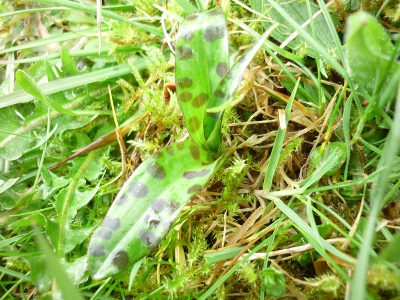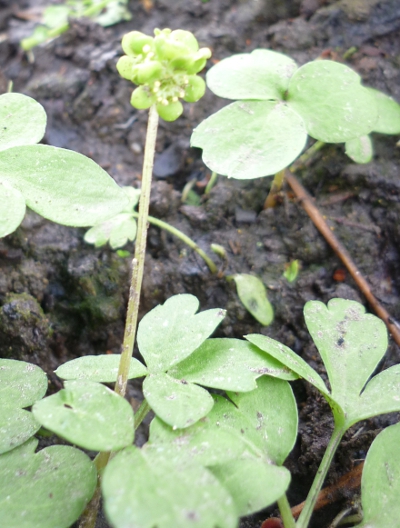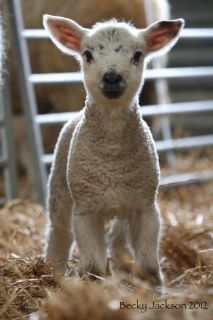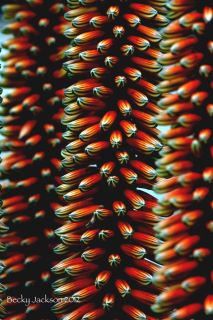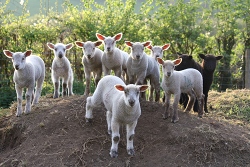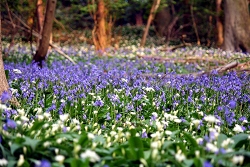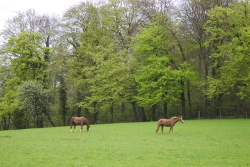Just two of the plants flowering in the silage fields in early May.
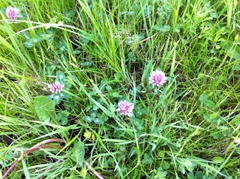
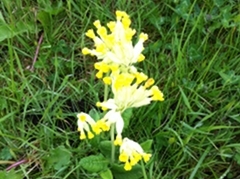
Flowering dates
Hedge laying 2013
The hedge we laid this winter in the first seriously warm sun of the year…
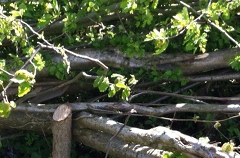
and in context of the hedge laid 5 years ago, and the pasture and woodland behind…
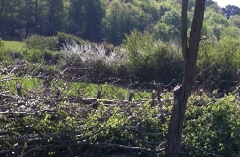
The Owl and the Pussycat
There seems to be an autumn and spring owl conspiracy – our last post in the autumn was about the owl knocked out in a hailstorm – this sound file was recorded just outside the farmhouse – with owl and pussycat determined to have a conversation…
Post Script – if you can hear the sound of waves lapping on the shore as they go out to sea then it must be in your imagination!!
Hail Owl or Tawny Owl
It has been an extraordinarily wet summer and so it continues. Today was thunder and very heavy, thankfully short lived, hail showers. We are feeding the youngstock in the field (lots of poor quality grass is being supplemented by the arable silage we made earlier). To get to the point…
In the middle of the heaviest shower Ad put out a new bale of silage for the youngsters and came back rather wet. Then for whatever reason Melanie also went to check on them. To find, flat on its back, wings outstretched, the owl you see in the photograph – now recovering with veterinary help…

Plant survey – well the beginnings
I love that part of our job that is to look after and encourage the rarer and therefore more interesting plants that are natural to the different soils over the farm. This is particularly so on the thin Cotswold Brash soil on the edge of the escarpments. Each year we do a few things with the Gloucestershire Wildlife Trust and I was really delighted when Clare offered to survey some of the fields – what follows are her words and pictures – thank you Clare.
“I walked along the slope beneath Abbey woods which was fairly typical improved grassland, but towards the far end of the slope above a patch of blackthorn there’s an area that is really quite rich with limestone indicator species such as Mouse-ear Hawkweed (Pilosella officinarum), Upright Brome (Bromopsis erecta) and Salad Burnett (Poterium sanquisorba) and Cowslip (Primula veris). There were also some spotted orchid leaves (see picture) – currently identified as Orchis mascula (Early purple orchid) but to be sure one might have to check when it’s in flower! It could be Common spotted-orchid (Dactylorrhiza fuchsii).
It does seem as if that end of the field is benefitting from it’s proximity to Swift’s Hill…
I also made a species list of everything I could see growing close to the banks of the Slad Brook, just downstream of the little stone bridge. There were some interesting finds, notably lots of Moschatel or Townhall Clock (Adoxa moschatellina),
that I’ve attached a picture of (sorry its not in better focus)- it’s the only species of it’s family we find in the UK.
Where the livestock have poached the ground near the stream I found Common Bladder-moss (Physcomitrium pyriforme) 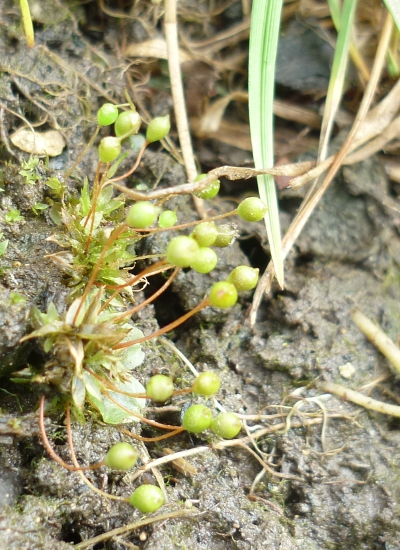
that likes the damp, disturbed habitat (picture attached).
There were also lots more nice flowering species including Valerian, Marsh Marigold and Brooklime.
I had a great time doing it, very friendly lambs! Loved the video you sent a link to, thanks.”
Kestrel coming home (literally|) to roost
I have listened (turn your volume up!) and watched this happening for months and indeed several years – and eventually caught it on camera. And yes each morning at dawn this is the call that wakes us…
Deep rooting herbal leys
We really appreciated this video when we found it from our seed supplier – Ian shows very graphically why mixed species swards of grass, clover and herbs are so important to us and the wildlife here on the farm – and we have planted just such a ley this spring (2012)
